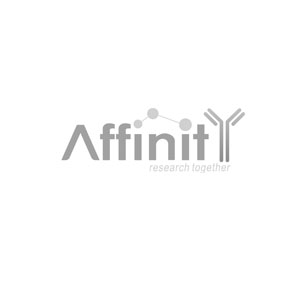CAPN7 Antibody - #DF9322
(1)
| Product: | CAPN7 Antibody |
| Catalog: | DF9322 |
| Description: | Rabbit polyclonal antibody to CAPN7 |
| Application: | WB |
| Reactivity: | Human, Mouse, Rat |
| Prediction: | Pig, Zebrafish, Bovine, Horse, Sheep, Rabbit, Dog, Chicken |
| Mol.Wt.: | 93kDa; 93kD(Calculated). |
| Uniprot: | Q9Y6W3 |
| RRID: | AB_2842518 |
Product Info
Source:
Rabbit
Application:
WB 1:1000-3000
*The optimal dilutions should be determined by the end user.
*Tips:
*The optimal dilutions should be determined by the end user.
*Tips:
WB: For western blot detection of denatured protein samples. IHC: For immunohistochemical detection of paraffin sections (IHC-p) or frozen sections (IHC-f) of tissue samples. IF/ICC: For immunofluorescence detection of cell samples. ELISA(peptide): For ELISA detection of antigenic peptide.
Reactivity:
Human,Mouse,Rat
Prediction:
Pig(88%), Zebrafish(100%), Bovine(100%), Horse(100%), Sheep(100%), Rabbit(100%), Dog(100%), Chicken(100%)
Clonality:
Polyclonal
Specificity:
CAPN7 Antibody detects endogenous levels of total CAPN7.
RRID:
AB_2842518
Cite Format: Affinity Biosciences Cat# DF9322, RRID:AB_2842518.
Cite Format: Affinity Biosciences Cat# DF9322, RRID:AB_2842518.
Conjugate:
Unconjugated.
Purification:
The antiserum was purified by peptide affinity chromatography using SulfoLink™ Coupling Resin (Thermo Fisher Scientific).
Storage:
Rabbit IgG in phosphate buffered saline , pH 7.4, 150mM NaCl, 0.02% sodium azide and 50% glycerol. Store at -20 °C. Stable for 12 months from date of receipt.
Alias:
Fold/Unfold
Calpain like protease; Calpain7; CAPN 7; Homolog of Aspergillus Nidulans PALB; PALBH;
Immunogens
Immunogen:
Uniprot:
Gene(ID):
Expression:
Sequence:
- Q9Y6W3 CAN7_HUMAN:
- Protein BLAST With
- NCBI/
- ExPASy/
- Uniprot
MDATALERDAVQFARLAVQRDHEGRYSEAVFYYKEAAQALIYAEMAGSSLENIQEKITEYLERVQALHSAVQSKSADPLKSKHQLDLERAHFLVTQAFDEDEKENVEDAIELYTEAVDLCLKTSYETADKVLQNKLKQLARQALDRAEALSEPLTKPVGKISSTSVKPKPPPVRAHFPLGANPFLERPQSFISPQSCDAQGQRYTAEEIEVLRTTSKINGIEYVPFMNVDLRERFAYPMPFCDRWGKLPLSPKQKTTFSKWVRPEDLTNNPTMIYTVSSFSIKQTIVSDCSFVASLAISAAYERRFNKKLITGIIYPQNKDGEPEYNPCGKYMVKLHLNGVPRKVIIDDQLPVDHKGELLCSYSNNKSELWVSLIEKAYMKVMGGYDFPGSNSNIDLHALTGWIPERIAMHSDSQTFSKDNSFRMLYQRFHKGDVLITASTGMMTEAEGEKWGLVPTHAYAVLDIREFKGLRFIQLKNPWSHLRWKGRYSENDVKNWTPELQKYLNFDPRTAQKIDNGIFWISWDDLCQYYDVIYLSWNPGLFKESTCIHSTWDAKQGPVKDAYSLANNPQYKLEVQCPQGGAAVWVLLSRHITDKDDFANNREFITMVVYKTDGKKVYYPADPPPYIDGIRINSPHYLTKIKLTTPGTHTFTLVVSQYEKQNTIHYTVRVYSACSFTFSKIPSPYTLSKRINGKWSGQSAGGCGNFQETHKNNPIYQFHIEKTGPLLIELRGPRQYSVGFEVVTVSTLGDPGPHGFLRKSSGDYRCGFCYLELENIPSGIFNIIPSTFLPKQEGPFFLDFNSIIPIKITQLQ
Predictions
Predictions:
Score>80(red) has high confidence and is suggested to be used for WB detection. *The prediction model is mainly based on the alignment of immunogen sequences, the results are for reference only, not as the basis of quality assurance.
Species
Results
Score
Horse
100
Bovine
100
Sheep
100
Dog
100
Zebrafish
100
Chicken
100
Rabbit
100
Pig
88
Xenopus
0
Model Confidence:
High(score>80) Medium(80>score>50) Low(score<50) No confidence
High(score>80) Medium(80>score>50) Low(score<50) No confidence
PTMs - Q9Y6W3 As Substrate
| Site | PTM Type | Enzyme | Source |
|---|---|---|---|
| M1 | Acetylation | Uniprot | |
| Y42 | Phosphorylation | Uniprot | |
| K74 | Ubiquitination | Uniprot | |
| S75 | Phosphorylation | Uniprot | |
| K80 | Ubiquitination | Uniprot | |
| K82 | Ubiquitination | Uniprot | |
| T95 | Phosphorylation | Uniprot | |
| K130 | Ubiquitination | Uniprot | |
| K135 | Ubiquitination | Uniprot | |
| K156 | Acetylation | Uniprot | |
| K156 | Ubiquitination | Uniprot | |
| K167 | Ubiquitination | Uniprot | |
| S190 | Phosphorylation | Uniprot | |
| K217 | Ubiquitination | Uniprot | |
| K247 | Ubiquitination | Uniprot | |
| S251 | Phosphorylation | Uniprot | |
| K253 | Ubiquitination | Uniprot | |
| K309 | Ubiquitination | Uniprot | |
| K320 | Ubiquitination | Uniprot | |
| K331 | Ubiquitination | Uniprot | |
| K344 | Ubiquitination | Uniprot | |
| K356 | Ubiquitination | Uniprot | |
| S412 | Phosphorylation | Uniprot | |
| S414 | Phosphorylation | Uniprot | |
| T416 | Phosphorylation | Uniprot | |
| K419 | Ubiquitination | Uniprot | |
| K477 | Ubiquitination | Uniprot | |
| Y489 | Phosphorylation | Uniprot | |
| S490 | Phosphorylation | Uniprot | |
| K495 | Ubiquitination | Uniprot | |
| K503 | Ubiquitination | Uniprot | |
| K556 | Ubiquitination | Uniprot | |
| K596 | Ubiquitination | Uniprot | |
| K617 | Ubiquitination | Uniprot | |
| Y619 | Phosphorylation | Uniprot | |
| Y620 | Phosphorylation | Uniprot | |
| Y627 | Phosphorylation | Uniprot | |
| S635 | Phosphorylation | Uniprot | |
| K641 | Ubiquitination | Uniprot | |
| Y659 | Phosphorylation | Uniprot | |
| Y667 | Phosphorylation | Uniprot | |
| K695 | Ubiquitination | Uniprot | |
| S697 | Phosphorylation | Uniprot | |
| S700 | Phosphorylation | Uniprot | |
| K712 | Ubiquitination | Uniprot | |
| K723 | Ubiquitination | Uniprot |
Research Backgrounds
Function:
Calcium-regulated non-lysosomal thiol-protease.
Subcellular Location:
Nucleus.
Tissue Specificity:
Ubiquitous.
Family&Domains:
Belongs to the peptidase C2 family.
Restrictive clause
Affinity Biosciences tests all products strictly. Citations are provided as a resource for additional applications that have not been validated by Affinity Biosciences. Please choose the appropriate format for each application and consult Materials and Methods sections for additional details about the use of any product in these publications.
For Research Use Only.
Not for use in diagnostic or therapeutic procedures. Not for resale. Not for distribution without written consent. Affinity Biosciences will not be held responsible for patent infringement or other violations that may occur with the use of our products. Affinity Biosciences, Affinity Biosciences Logo and all other trademarks are the property of Affinity Biosciences LTD.
